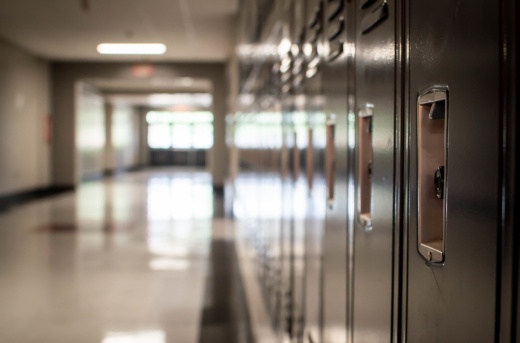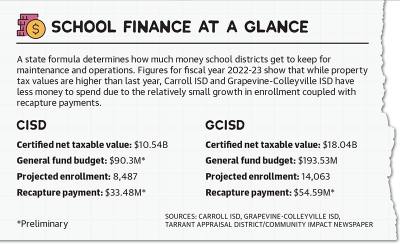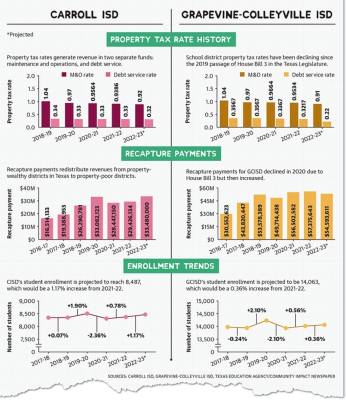But the increased tax revenues do not translate into more spending for the school districts, where officials are grappling with tight budgets, little student enrollment growth and the need to increase pay to attract and retain teachers and staff.
Both districts will also be making recapture payments to the state as part of a process that redistributes tax dollars from property-wealthy districts to those deemed property-poor by the Texas Education Agency.
“Even though we collect the increased taxes, we don’t get to keep it,” said David Johnson, CISD assistant superintendent for financial services, addressing the board of trustees in late July.
GCISD trustees approved the district’s fiscal year 2022-23 budget in a 4-3 vote on June 20 that requires cutting spending by more than $4.44 million during the school year to align expenses with revenues.
CISD trustees, meanwhile, are expected to vote to adopt the district’s budget in late August. The district plans to use $4 million from the sale of the former administration building on Dove Road along with nearly $3 million in property tax revenue it will be allowed to keep in connection with 2021’s Winter Storm Uri to balance its budget. Both are one-time options not available in the future, Johnson said.
School officials are looking to Texas legislators to make changes in the school finance law, which is based on a complicated formula that is applied statewide.
“We’re cognizant of the fact that the legislature is going to convene in January, and given the inflationary pressures and some of the things that are posing enormous challenges to districts across the state of Texas, I think they’ll see pressure to make an adjustment to the basic allotment, which ...[determines] revenue,” Johnson said. “I’m hopeful that the legislature will do something with that to provide district relief.”
Split vote on budget
GCISD’s adopted budget for the fiscal year that began July 1 includes $193 million for the general fund, $56 million in debt services and about $6.2 million for child nutrition.
Trustees Becky St. John, Coley Canter and Jorge Rodriguez voted against the budget, citing concerns with how it was balanced.
“The district will continue to evaluate positions and staffing and make reductions through attrition where feasible,” according to a board presentation. If reductions throughout the year do not cover the budget shortfall, the district will need to amend its budget at the end of the year, the presentation stated.
A final property tax rate will be approved in August or September, GCISD Chief Financial Officer DaiAnn Mooney said.
For the general operating budget, payroll costs make up 87.11% of the budget at around $115 million.
The board of trustees also voted 4-3 at the meeting to approve raises for staff. Starting teacher salaries will begin at $57,000. Teachers, nurses and librarians will receive a raise of 2% of the midpoint rate for their salary range, while other employees, including paraprofessionals, custodians and attendance clerks, will receive a raise of 1% of the midpoint rate. The pay increase will be at least $1,250 for all teachers, nurses and librarians, according to the budget presentation. Trustees Canter, St. John and Rodriguez voted against the raises, saying they wanted the 2% wage increase to apply to all staff.
The recapture payment, also known as a Robin Hood payment, to the state is projected to be $54.6 million, which is a decrease from the nearly $57.4 million payment made in FY 2021-22.
Mooney said the budget is “a plan” that will be amended as the school year progresses.
Final budget still to come
Because CISD’s fiscal year begins Sept. 1, officials are still working through the final numbers. A workshop is scheduled for Aug. 15 with a vote on the final budget planned for Aug. 29.
Preliminary numbers show total expenditures of more than $90.3 million with a projected student population for the upcoming school year of 8,487.
Higher pay for teachers and staff will be part of the upcoming budget.
Trustees voted unanimously June 20 to increase the starting pay for new teachers with no experience to $58,600. That is up from the $56,100 salary in the most recent school year, according to district documents.
The board also approved incremental raises for teachers based on experience. There will be 4.5% raises for teachers with 1-10 years of experience. Those with 11-15 years get a 5% raise, and those with 16-20 years of experience get a 5.5% raise. Those with 20-25 years of experience will get a 6% raise. Those with 26-30 years will get a 6.5% increase, and those with 31-plus years of experience will get a 7% raise.
The total cost to the district for those increases is more than $2.16 million, according to Lauren Wurman, the district’s executive director of human resources.
The raises for teachers are in addition to the one-time retention payments of between $1,600-$3,200 approved by the board May 23.
Also at the June 20 meeting, the board approved a 2% midpoint raise increase for all other district staff, including clerical, nutrition and transportation workers.
At a July 25 meeting, trustees approved a $2 hourly increase for child nutrition employees and a starting pay of $13.50 per hour.
All of the salary increases will be incorporated into the budget for the Aug. 15 workshop.








